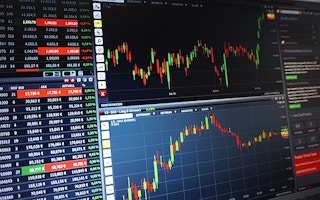IBM’s new ad campaign features a jumble of corporate jargon—there are boasts of “a cloud platform built enterprise-strong” — next to a multiethnic array of models, each meant to represent a particular profession. A banker tops the page. Next to his face, it reads, “I can turn weather and tweets into high-yield returns.”
IBM computers can sort through data — from tweets to temperature readings — to help investors make decisions. The ad speaks to the promise of computing technology, but it alludes to something murkier.
In the age of climate change, businesses and investors are looking for ways to turn a profit on bad weather.
There is a mountain of research detailing the ways climate change will stunt the economy. A recent study details how rising temperatures will slowly chip away at the US gross domestic product. But, a crisis for some is an opportunity for others.
“
I could go to a business school and say, ‘Hey, you guys are really going to have to start understanding not only the statistics of weather, but the changing statistics of climate to be effective.’
David Titley, prrofessor of meteorology, Penn State
Shipping firms are looking to vanishing sea ice to open up Arctic passageways, and mining companies are exploring for minerals in parts of Greenland uncovered by melting. Defense contractors see instability in vulnerable regions as an opportunity to sell “military products and services.”
Pharmaceutical companies expect rising temperatures to fuel the spread of vector-borne diseases like malaria, increasing demand for mosquito nets and vaccines. Then, there are the companies buying up arable land and water rights, which will become more valuable as heat and drought stunt crop yields.
In the near-term, weather experts are looking for ways to use weather forecasts to make smart investments.
David Titley, formerly the Navy’s chief oceanographer, teaches meteorology majors at Penn State to use weather and climate projections to advise business leaders on risks — and opportunities.
“Let’s say if I know it’s going to be a particularly high chance of a cold and snowy period — let’s say in Washington, DC — if I’m a Home Depot, I’ll probably want to bring in extra snowblowers, extra winter-type gear,” said Titley.
“How do you think in terms of probabilities? And then, not only think in it, communicate it to your boss? Then, as we go forward, how do you do this in a changing climate?”
Titley, who has evangelised for climate action, believes businesses need to guard against climate risks. His students simulate trading in soybean and natural gas futures, two commodities affected by the weather.
Drought and heat hurt crop yields, while warm weather drives down demand for natural gas, which is used to heat homes. Students learn that a savvy meteorologist can use her knowledge of weather to protect her business from climate shocks.
One way to do that is to invest in weather derivatives, which pay out when the weather turns ugly. At one time, it was farmers and energy companies who traded weather derivatives, but increasingly it’s hedge fund managers who are placing chips on tomorrow’s forecast.
But, these investors aren’t trying to buy insurance against heat-induced crop failure. They are betting on the weather.
A few years ago, Wall Street firms were buying up weather derivatives that would pay out in the event of severe snowfall. Now, climate change is shifting weather patterns, producing milder winters and hotter summers. Instead of betting on snow, firms are betting on heat and rainfall. The future will likely see more of the same.
Wall Street has a history of gambling on bad outcomes. In the lead-up to the 2008 financial crisis, investors bought credit default swaps, which paid out when homeowners defaulted on their mortgage.
Insurance giant AIG issued credit default swaps by the barrel. When the housing market collapsed, it had to pay out billions to investors. It’s conceivable that weather derivatives would produce a similar outcome.
Betting big on weather and coming up short up could cripple investment firms, insurance companies or both.
In the age of climate change, it pays to be cautious, and it pays to understand the weather.
For a 2007 experiment, business students and meteorology students at Penn State made investments based on projections of the daily high and low temperature in different US cities. Predictably, meteorology majors fared far better than business majors.
As Titley explained, “I could go to a business school and say, ‘Hey, you guys are really going to have to start understanding not only the statistics of weather, but the changing statistics of climate to be effective.’”
Jeremy Deaton writes for Nexus Media, a syndicated newswire covering climate, energy, policy, art and culture. You can follow him @deaton_jeremy.
This story was published with permission from Nexus Media.










